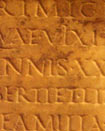
So this article was on Yahoo today.
Basically, The Pope is endorsing Latin masses again. Apparently in up until the 1960's it was the norm. From the article-
"Before the Second Vatican Council (1962-1965), Catholic mass was an elaborate ritual led in Latin by a priest with his back to the congregation. Vatican II reduced the formality and had the priest face the faithful to pray in their local language.
Traditionalists rejected the new style's sing-along hymns and guitar music. Many missed the Latin rite's sense of mystery and awe and the centuries-old Gregorian chant that went with it."
Now, to me this seems like a no-brainer. A service in Latin? Yikes. No body can understand it! If that's what "mystery and awe" means then to each his own, but I'd at least like to hear about God in English so I can then ponder the mystery and be in awe- because I don't understand God... NOT WHAT LANGUAGE THE SERVICE IS IN.
Obviously my protestant bias and gross lack of Church history is showing here. But this got me thinking...
Does protestant Christianity do the same thing? Think about it- don't we have a language all our own? Fellowship...Narthex...Sacristy...Transubstantiation...Epistle...Abrahamic Covenant...Sanctification...I could go on.
I think a lot of times theres a "lingo" that unless you've just been around a long time you won't understand because no one stops to explain things. So although our services are given in English, consider the following being mentioned in the service:
"Today's scripture lesson is from Paul's second Epistle to the church in Corinth." Now, what all does this phrase assume?
1. That you know what an epistle is
2. That you know who Paul is
3. That you understand the inherent connection between Paul and the epistles
4. Basically that you have enough Biblical and Ecclesial knowledge to translate into: 2nd Corinthians
I would guess that many folks sitting in the congregation wouldn't be able to articulate those 4 things, and why should they unless they've been taught or given the proper tools to discover it for themselves? If you haven't taken bible classes in church or in college or you haven't been raised in Sunday school where do you get to know all the fancy phrases?
My pastor calls it "church-eese" or "christian-eese" and we need to be mindful that we articulate such specialized language. The church can't be so presumptuous to just assume people either know this stuff or will have the where-with-all to go figure it out themselves.
If we don't give consideration to issues like this, we might as well give the services in Latin.

3 comments:
just be sure not to drop it, but explain it.
I don't think we should drop it either. People don't have a problem with ritual, they have a problem with empty ritual, or unexplained ceremonies if you prefer.
I know people who find Latin mass a very purposeful worship service. In fact, they claim that because they had to make the extra effort to understand the Latin, it makes worship much more relevant. I actually think it is beautiful - I used to go to them when I was a kid.
I watched my mom's best friend, a devout Catholic, weep for joy during a Latin mass. She didn't care who was watching. When I think of true worship, I think of how moved she was.
I think the Pope was trying to rein in the fringes when he made his edict. I wouldn't mind going, as long as I could find my buddie's catechism books.
Post a Comment